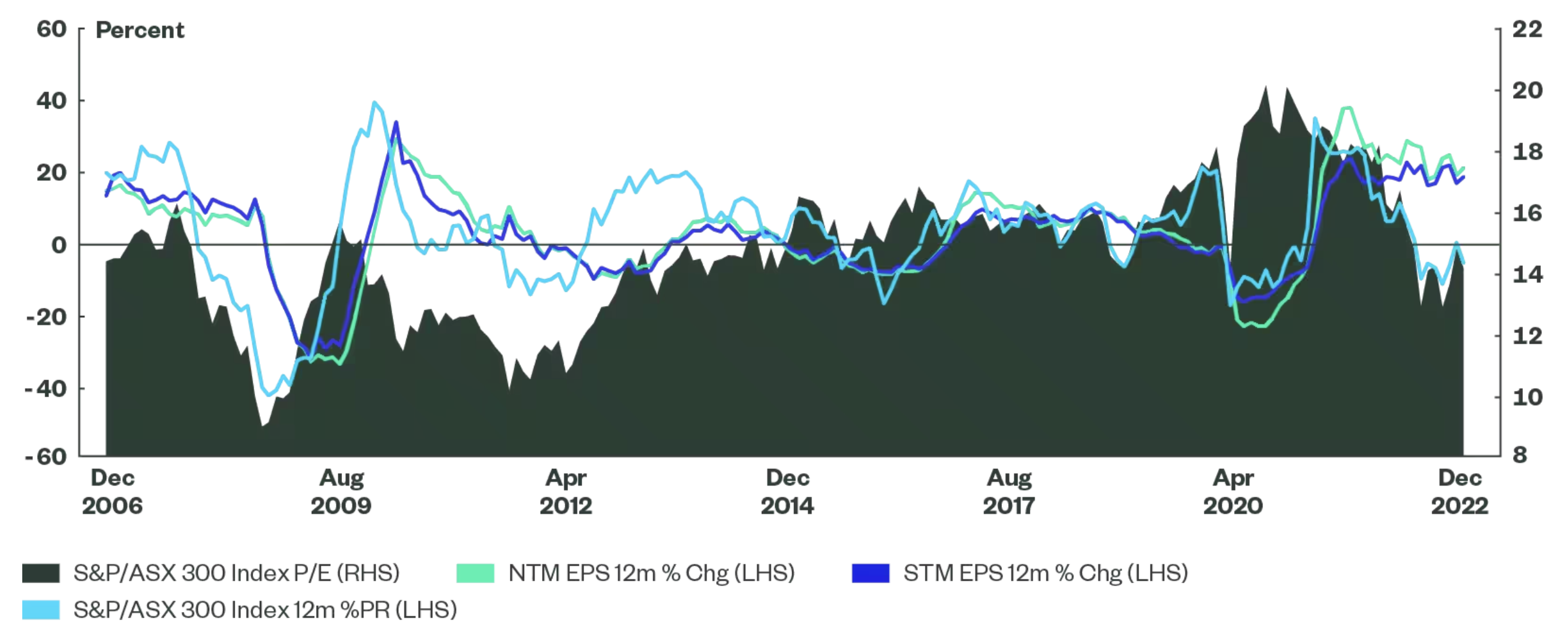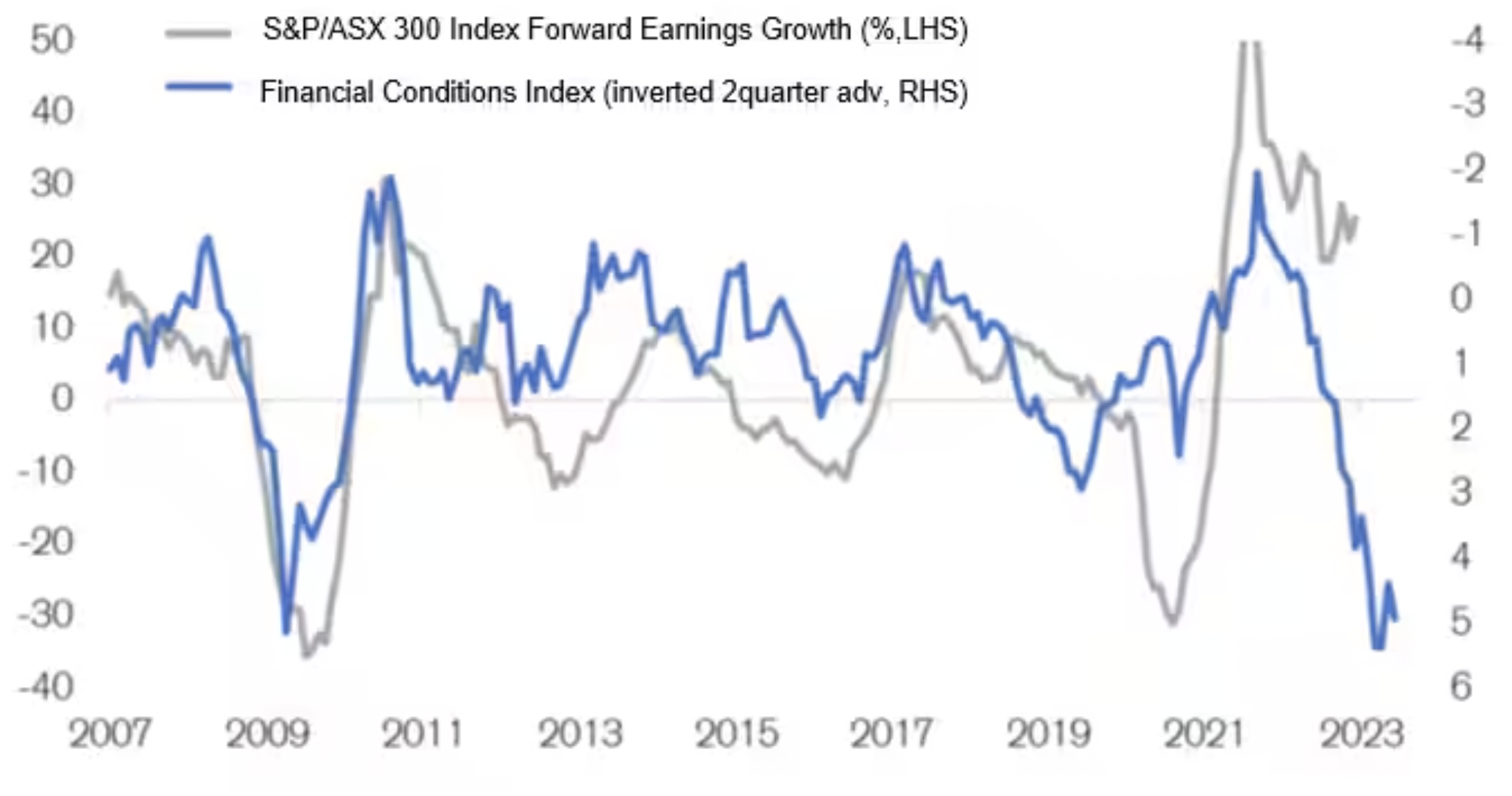Seek shelter in defensives amid falling growth and financial conditions
Key market themes for Australian equities in 2023
- Falling growth as financial conditions tighten. Domestically, the main concern over 2023 will be the fallout from tightening financial conditions which is yet to be fully reflected across household activity due to 1) higher savings buffers and 2) the benefit of low fixed rate mortgages (housing is a key tightening channel: ~2/3 of outstanding fixed rate mortgages will expire by the end of 2023. Both tailwinds will begin to erode over 2023.1 which suggests further pullback in household discretionary spending. While headline inflation is expected to ease following the decline in oil prices, concerns around wage growth remains. With the unemployment rate back to 50yr lows, wage growth pressures remain significant. However, forward demand indicators have mostly levelled off and we expect more meaningful weakness to emerge from 1Q23 as broader activity slows and labor supply is boosted by an uplift in net migration.
- Equity valuations have de-rated in 2022 (FY1 PE from 24x to 14.3x) and are near long-run averages (14.7x since 1992), but earnings still at peak levels as shown below:
Figure 1: S&P/ASX 300 Index – Earnings, Returns and Valuations

From a real-earnings perspective overall market valuations can still be considered rich due to the impact of high margins which is vulnerable to rising costs, especially labour expense. Consensus profit margin forecasts by and large have remained static and in many cases above pre-Covid norms. Based on falling Financial Conditions Indices, we can expect to see material declines in earnings as growth and profits are hit by the lagged effect of an aggressive tightening cycle.
Figure 2: Tightening financial conditions lead falling earnings growth

Stay true to your objective of managing volatility and downside risk
While some may say that a benchmark-relative approach is the best way to select and assess active equity managers, we believe investor objectives, not benchmarks, belong at the centre of portfolio construction. We define true success as not only producing “alpha”, but also managing total portfolio risk and we believe that managing volatility and reducing the impact of market losses will be key in 2023.
Investors who are invested in a benchmark-like Australian equity strategy should ask themselves – what is the key objective of my strategy? Is it aligned with getting exposure to the high cyclicality that is embedded in the Australian equity market?
How we approach concentration risks in banks and miners
As we enter 2023, the combination of higher rates and inflation is just beginning to impact consumers and borrowers, and we are likely to see further deterioration in discretionary expenditure during the year. This is likely to have flow-through effects on credit growth and the potential asset quality of banks.
Being benchmark agnostic means that our approach explicitly ignores large index concentrations, and aims to hold more stable, higher quality and less cyclical companies in a way that minimizes overall portfolio volatility and drawdown risk.
While valuations for the big 4 banks remain undemanding and our model’s overall assessment of them varies between neutral to positive (NAB has the highest expected returns), that does not mean we hold the big 4 banks at anywhere near benchmark weights. Rather, our explicit focus on volatility management translates into a portfolio that is highly diversified across different stocks and sectors, with an emphasis placed on defensive names.
The same approach is applied to our holdings of Australian miners. BHP, for example, is an attractive stock from a fundamental perspective – with a strong balance sheet and a healthy portfolio mix of commodities. However, its cyclical nature is reflected in its higher earnings and price volatility means that BHP has a beta of 1.4. This cyclicality translates to a lower absolute weight in our defensive portfolio. While the Fund has some cyclical exposures, these are measured and are selective to those companies that help the overall portfolio generate the best risk-adjusted returns.
Our preferred defensive sectors are currently:
- Communication Services
- Food and Staples, and
- Health Care.
The relatively higher weights allocated to these sectors reflect our conviction that these high-quality stocks will be able to produce higher earnings and share price resilience in an environment of lower growth and tight monetary policy.
1 APRA, RBA, Macquarie Macro Strategy as of December 2022.
Learn more about risk-aware investing
For more details on how State Street Australian Equity Fund can play a part in your asset allocation, click the contact button below, or visit our website for more information.
2 topics

Bruce is Head of Active Quantitative Equity - Australia, for State Street Global Advisors. He has over 20 years' experience, covering Australian and global equites, long and short equities as well as global macro strategies.

Bruce is Head of Active Quantitative Equity - Australia, for State Street Global Advisors. He has over 20 years' experience, covering Australian and global equites, long and short equities as well as global macro strategies.
